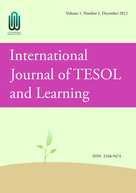


Volume 11 Issues 1-4 (2022-12-31)
Volume 10 Issues 3&4 (2021-12-31)
Volume 10 Issues 1&2 (2021-06-30)
Volume 9 Issues 3&4 (2020-12-31)
Volume 9 Issues 1&2 (2020-06-30)
Volume 7 Issues 3&4 (2018-12-31)
Volume 6 Issues 3&4 (2017-12-31)
Volume 6 Issues 1&2 (2017-06-30)
Volume 5 Issues 1&2 (2016-06-30)
Advice delivery has been regarded as a face-threatening speech act. This study compares the advice-soliciting strategies used by NS and NNS students in writing conferences. The data consists of 10 conference sessions held by two instructors and ten students (five NS students and five NNS students). Eight sequences of soliciting advice were identified and classified. It was found that for both groups, one advice pattern (instructor identifies problem) dominated in this institutional context, in which the instructor is expected to diagnose problems in students’ writing. However, unsolicited advice patterns (instructor identifies problem or volunteers advice) were most dominant in the NNS students’ conferences, while in NS students’ conferences, the instructor and students participated more equally. Particularly, NS students asked more questions to solicit the instructor’s opinion or to seek confirmation. Follow-up interviews with the students indicated that NNS students were not familiar with the discursive practices of writing conferences and have different concerns of the face. The findings add to the understanding of advice delivery in institutional settings and speculate on aspects that contribute to learners’ interactional competence.
This study aimed to identify significant predictors of Chinese college students’ performance on an English pragmatic competence test. Linguistic competence and pragmatic competence are the two additive components of communicative competence; they become the two faces of communication. However, the pragmatic aspects have often been neglected in the assessment of ESOL students’ English proficiency. A 24-item multiple-choice College English Pragmatic Competence Test (CEPCT) was administered to 2,503 Chinese college students learning English as a foreign language. The results indicated that Chinese college students’ gender, major, college English examination test score, and self-rating of English oral proficiency were significant predictors of their CEPCT scores. However, the frequency of using English with English-native speakers was not a significant predictor.
The research described in this article is based on a longitudinal study into the attitudes and current practices of Taiwanese teachers in buxiban (so-called “cram schools”) toward professional development. Data results from the survey questionnaire, which was administered twice (2004 and 2008), were analyzed using various statistical computations to measure reliability, cross-tabulations for measuring satisfaction levels on various attributes, t-tests, and gap analysis to measure the level of importance and satisfaction in the side-by-side matrix question. Important implications are discussed.
Limited attention has been given to the motivational factors, as well as the racial and environmental circumstances that are unique to the academic behaviors and resiliency of minority youths. This paper seeks to explain the beliefs and attitudes that lead to academic behaviors and posits that school engagement, performance, and persistence in an academic task are linked to one’s belief about his or her purpose, meaning, value, and capability of achieving such academic tasks. Throughout this paper, the relationship between racial identity, motivation, and academic performance will be explored through the examination of identity, legacy of competence, acquired immunities, and vision.
2ND Untested Ideas International Research Conference
June 27 – 29, 2014
The Sheraton Rhodes Resort, Rhodes, Greece